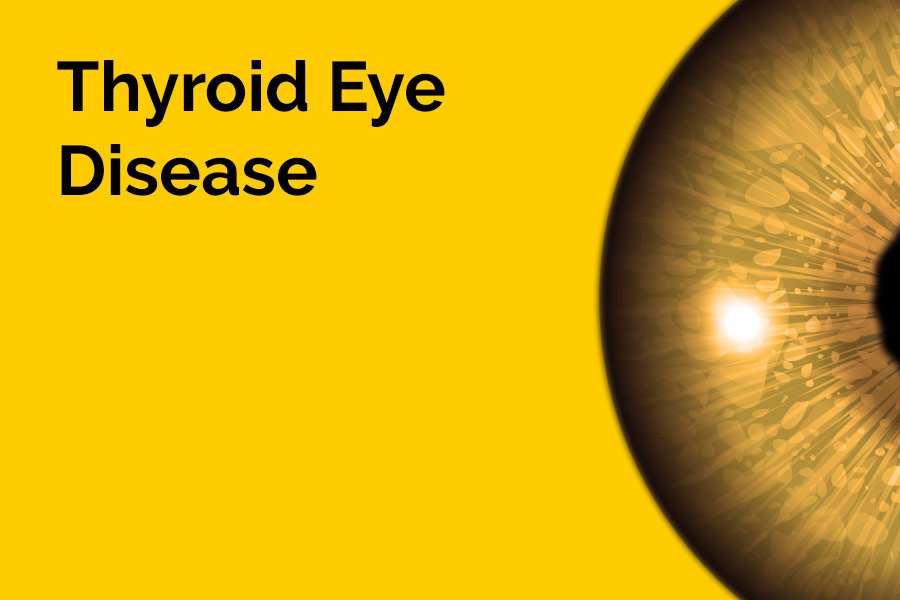Thyroid Eye Disease
Thyroid eye disease (TED) or Graves’ ophthalmology causes the muscle and soft tissue of your eye socket to swell. This occurs when there is a problem with the thyroid gland. Thyroid eye disease is also known as thyroid associated ophthalmology, thyroid orbitopathy or Graves’ orbitopathy or ophthalmopathy.
Thyroid eye disease affects the soft tissues surrounding the eyeball within your eye socket. TED usually occurs when there is a problem with the thyroid gland, although in some cases it may occur when the thyroid gland is functioning properly.
The Thyroid Gland
The thyroid gland is a small gland located near the top of the windpipe (trachea) at the front of your neck. It plays an important role in controlling the speed in which chemical reactions happen in the tissues inside the body (metabolic rate).
TED is an autoimmune disease that generally occurs as the result of an overactive thyroid gland (hyperthyroidism). The immune system generally creates small proteins or antibodies to attack germs such as bacteria. In autoimmune disease, the immune system makes antibodies that target the tissues of the body.
Autoimmune thyroid disease occurs when the body’s antibodies attack the thyroid gland. In some individuals, these same antibodies also attack the tissues around the eyeball, leading to thyroid eye disease.
Symptoms
Thyroid eye disease can cause aching behind the eye, especially when looking up, down or sideways. This achy feeling is particularly unpleasant in the mornings.
The front of the eyes can become red and irritated as the cornea is less well covered or lubricated by the eyelids.
Your eyes may feel dry and appear bulgier.
As the muscles become too swollen to work correctly you may experience double vision (diplopia).
Your eyes may have increased sensitivity to light (photophobia) and become difficult to move.
Both eyeballs are not always equally affected and other non-eye related symptoms may appear as a result of the overactive thyroid gland.
Diagnosis, Screening and Tests
If you have already been diagnosed with a thyroid gland problem diagnosis can be made simply by examining the eyes.
Blood tests
On occasions, blood tests are required to back up the diagnosis. These tests highlight how well the thyroid is functioning. If the doctors need to take a further look at the amount of swelling in the eye socket they may organise an MRI scan.
Other tests
Doctors will want to assess your general eye health carefully. This may include testing for how well you see colours, how good your peripheral vision is, and eye movement tests to see how much the muscles have been affected.
Treatments
If left untreated the inflammation caused by TED will gradually disappear however the physical changes caused by the swelling may still remain. This is because some of the tissues that have been stretched may not always return to their original form. The aim of treatment is to limit inflammation and swelling occurring during the inflamed period and to protect the surface of the eye. Treatments are also available for people whose tissues have not been able to return to their original form after the inflammation has settled.
Prevention
Patients with TED who smoke are less likely to respond to treatments than those who do not. Non-smokers and ex-smokers are also more likely to be cured of their thyroid over-activity after a course of Carbimazole or Propylthiouracil treatment, than active smokers. For help on how to stop making please consult your local NHS stop smoking service.
Selenium supplements can be purchased over the counter and have been known to be beneficial to those with mild active TED. The supplements are recommended to be taken over the course of 6 months with two 100mcg servings per day.
Ensure that you have regular thyroid blood tests and follow the advice given to you by your doctor about when and how to take your medication. This will ensure that your thyroid levels remain normal and steady, giving your eyes a better chance of healing.
